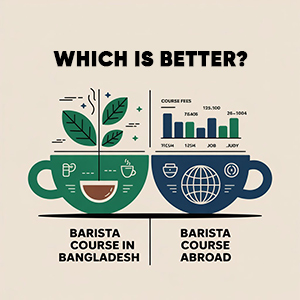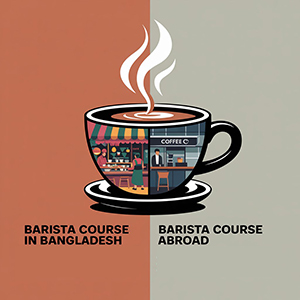Barista Course in Bangladesh vs Abroad: Which is Better?
The world of coffee has evolved far beyond the simple morning cup. Today, being a barista is not just a part-time café job; it’s a skilled profession, blending art, science, and customer service. As the coffee culture in Bangladesh continues to grow, more people are considering a Barista Course in Bangladesh to gain formal training and enter this exciting career.
But if you’re serious about becoming a professional barista, there’s an important question you’ll face: Should you take a barista course in Bangladesh, or should you go abroad for your training?
Both options have unique advantages and potential drawbacks. In this guide, we’ll break down the differences, costs, opportunities, and outcomes, so you can make a confident decision that matches your goals, budget, and lifestyle.
Understanding the Role of a Barista
Before comparing courses, it’s important to clarify what a barista does.
A barista isn’t just someone who makes coffee. They’re coffee experts—skilled in brewing methods, espresso techniques, latte art, customer service, and even café workflow. They must understand coffee beans, grind settings, water temperature, milk texturing, and presentation.
In short, baristas combine technical precision with creativity and hospitality.
This is why proper training is essential—and why choosing the right training location matters.
Studying in Bangladesh: The Local Advantage
Taking a barista course in Bangladesh has some undeniable benefits, especially for beginners or those planning to work locally.
Lower Cost of Education
A major advantage is affordability.
- Course Fees: In Bangladesh, professional barista training programs can range from ৳15,000 to ৳60,000 depending on the academy and course length.
- Living Costs: You won’t have to spend extra on international travel, visas, or accommodation.
If your goal is to work in Bangladesh immediately after training, this cost-effectiveness makes perfect sense.
Comparing Key Factors
Factor | Barista Course in Bangladesh | Barista Course Abroad |
Cost | Affordable (৳15k–৳60k) | Expensive (৳3–8+ lakh) |
Certification | Local or ISO-certified | Internationally recognized |
Curriculum | Focused on the local market | Broader, global standards |
Networking | Local café connections | International contacts |
Job Opportunities | Strong locally | Strong abroad + locally |
Travel Requirements | None | Visa + relocation |
Which One Should You Choose?
The decision depends on your career goals, budget, and where you want to work.
Option 1: You Plan to Work in Bangladesh
If your main goal is to start your career quickly and save on costs, choose a barista course in Bangladesh. You’ll:
- Learn skills relevant to local cafés.
- Pay a fraction of the cost.
- Start earning sooner.
Option 2: You Want an International Career
If you aim to work in Australia, Canada, the Middle East, or Europe, an international course can make your CV stand out.
However, you can also take a hybrid path, start with a local course to build your foundation, then upgrade with a short, advanced course abroad.
Pro Tip:
Some Bangladeshi academies now partner with international training bodies like the Specialty Coffee Association (SCA). These programs offer dual certification, giving you the best of both worlds without paying full foreign tuition.
Why the Final Decision Favors a Barista Course in Bangladesh
While international courses have prestige, here’s why starting in Bangladesh often makes the most sense—especially if you’re new to the industry:
- Lower Risk, Higher Flexibility – You invest less money, so you can test whether you truly love the work before committing to a costly international program.
- Faster ROI – With lower costs and immediate job opportunities, you recover your investment quickly.
- Build Local Experience First – Many café chains abroad prefer candidates with proven experience, even if they have certifications.
- Strong Industry Growth – Bangladesh’s coffee culture is booming, meaning more jobs and business opportunities right here.
Example Career Path:
- Take a 6-week ISO-certified barista course in Dhaka.
- Work in a local specialty coffee shop for 1–2 years.
- Enroll in an advanced barista course abroad (3–6 weeks) to upgrade skills.
- Apply for international café jobs with both experience and global certification.
Pro Tips for Choosing the Right Course (Anywhere)
- Check the Trainer’s Experience: Look for instructors with international certifications and real café management experience.
- Ask About Equipment: The school should use professional-grade espresso machines, grinders, and brewing tools.
- Small Class Sizes: This ensures more hands-on practice and personal feedback.
- Job Placement Support: Ask if they help students find work after graduation.
- Reviews and Alumni Feedback: Past students can give honest insights into the quality of the course.
Final Thoughts
Both a barista course in Bangladesh and a barista course abroad can lead to a successful coffee career. The main difference lies in cost, exposure, and your long-term goals.
If you’re just starting, it’s often smarter to train locally first, gain confidence, earn some income, and then explore advanced opportunities abroad. This step-by-step approach keeps your risk low while building a strong foundation for growth.
In the end, your passion, dedication, and willingness to practice every day matter far more than the country where you study. Whether you’re steaming milk in Dhaka or pulling espresso shots in Melbourne, the skills you build will shape your journey in the world of coffee.









